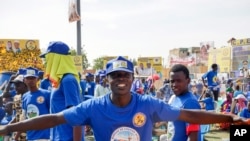Voters in Chad head to the polls Sunday for a presidential election in which Idriss Deby is widely expected to extend his three-decade rule despite growing signs of popular discontent and opposition criticism over his handling of oil wealth.
Deby, 68, is one of Africa's longest-serving leaders and an ally of Western powers in the fight against Islamist militants in West and Central Africa.
He seized power in 1990 in an armed rebellion, and in 2018 pushed through a new constitution that could let him stay in power until 2033, even as it reinstated term limits.
Deby has relied on a firm grip over state institutions and one of the region's most capable militaries to maintain power. He said recently he knew in advance that he would win again "as I have done for the last 30 years."
"Many of you, my daughters and sons, were not yet born when I took power in 1990," he said Friday at his final campaign rally. "You have asked me to be a candidate for this sixth term."
Among Deby's six rivals is former Prime Minister Albert Pahimi Padacke, but several leading opponents are boycotting the race, including the 2016 runner-up Saleh Kebzabo, who has vowed to make Chad ungovernable if Deby wins.
Several recent anti-government demonstrations in the capital, N'Djamena, have turned violent and there was a heavy military presence in the city Saturday.
As soldiers patrolled the streets, municipal workers collected car tires and plastics that protesters could set on fire.
Earlier this week, the authorities arrested several people, including at least one opposition leader, for what they said was a plot to assassinate politicians and bomb polling stations and the electoral commission headquarters.
The opposition said the arrests showed mounting repression under Deby, whose government has also arrested scores of people ahead of the vote, according to Human Rights Watch.
The government rejects allegations of human rights abuses.
It has come under increasing public pressure over a flagging economy as low prices for the main export, oil, in recent years forced cutbacks in public spending and sparked labor strikes.
Norbert Djimadoum, a N'Djamena resident, said he expected many people to express their dissatisfaction by staying home Sunday.
"There won't be a lot of enthusiasm at the polls tomorrow and that will be a victory for the start of change," he said.





